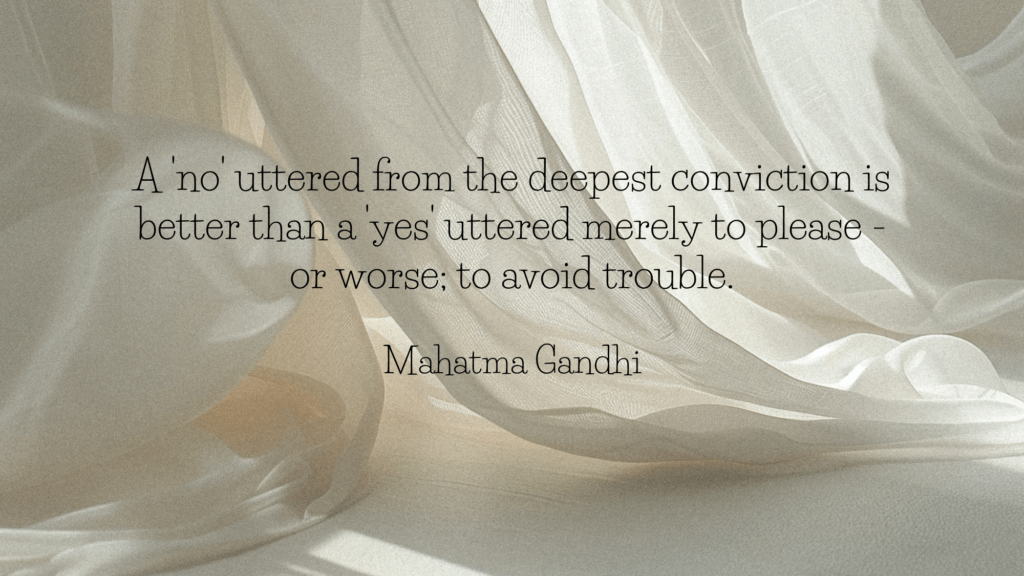Is the art of saying no really about saying ‘no’ at all, or is it about saying ‘yes’ to yourself?
You’ve likely felt that familiar tightness in your chest when you’re about to say “yes” to something your heart quietly protests. In a world that celebrates constant availability and endless giving, your tendency to accommodate others at the expense of your own well-being isn’t just a habit—it’s a learned survival strategy.
Yet beneath each reflexive “yes” lies a profound opportunity to honor your authentic self and reshape your relationship with boundaries. As you stand at this threshold between people-pleasing and self-respect, you’ll discover that mastering the art of “no” isn’t about rejection—it’s about revolution.
Understanding Your ‘Yes’ Pattern
Your pattern of saying “yes” often stems from early programming that equates compliance with acceptance and love.
You’ve likely internalized messages from childhood, work, or relationships that tied your worth to how much you could accommodate others’ needs and wishes as priority.
When you automatically say ‘yes,’ you’re often responding to subconscious triggers formed through years of emotional conditioning that make saying no without feeling guilty seem impossible.
The subconscious programming behind people-pleasing
Behind every habitual “yes” lies a complex web of subconscious programming that often takes root in childhood. Your early experiences shape how you respond to requests, creating deeply embedded patterns that operate beneath conscious awareness.
When you automatically say “yes,” you’re often responding to subconscious triggers formed through years of emotional conditioning. Your people-pleasing tendencies likely stem from a fear of rejection or abandonment that your younger self experienced.
Perhaps you learned that your worth was tied to being helpful, compliant, or “good.” Societal expectations, especially those placed on certain genders or cultures, can reinforce these patterns, making it feel unsafe or selfish to prioritize your own needs.
These self-worth issues create an internal framework where saying “no” feels threatening to your sense of security and belonging. You’ve likely developed an unconscious equation: acceptance = compliance.
Breaking free requires understanding that your current “yes” pattern isn’t a character flaw but a survival mechanism you once needed. By recognizing these deep-seated programs, you can begin to consciously choose your responses rather than being driven by old conditioning.
How past experiences shape your relationship with ‘no’
Each moment you say “yes” when you want to say “no” echoes patterns established in your earliest relationships. Your past influences have quietly shaped your response to requests, creating deep-seated emotional triggers that surface when you’re faced with saying no.
Perhaps you learned early that rejection meant withdrawal of love, or that your worth was measured by your ability to accommodate others’ needs.
Cultural conditioning plays a pivotal role in your relationship with no. If you grew up in an environment where harmony was prized above personal boundaries, you’ve likely internalized these values as truth. Your fear factors might stem from childhood experiences where expressing disagreement led to conflict or disappointment from authority figures.
Understanding these patterns is essential for personal growth. When you recognize how your upbringing influences your present behavior, you can begin to separate old wounds from current realities.
Your difficulty with no isn’t a character flaw – it’s a learned response that served a purpose in your past. By acknowledging these deep-rooted patterns, you can consciously choose new responses that honor both your history and your current needs for healthy boundaries.
The Hidden Cost of Not Saying No

The art of saying no becomes crucial when you understand the true cost of constant accommodation
- Energy depletion and its impact
- The relationship between boundaries and self-respect
Your inability to establish firm boundaries sends a subtle message to both yourself and others that your time and energy hold less value than theirs.
Being taken for granted is insidious—it usually starts gradually and deepens over time. When you repeatedly say yes to others at the expense of your own needs, you drain your emotional and physical reserves until burnout becomes inevitable.
Energy depletion and its impact.
The hidden toll of saying “yes” too often manifests in three distinct forms of energy depletion: physical exhaustion, emotional burnout, and spiritual disconnection.
When you continuously put others’ needs before your own, you’ll experience a profound energy drain that seeps into every aspect of your life. Your body signals its protest through fatigue, tension headaches, and disrupted sleep patterns.
The emotional exhaustion runs deeper, leaving you feeling overwhelmed and disconnected from your authentic self. You’ll notice your creativity diminishing, your patience wearing thin, and your ability to make clear decisions becoming clouded.
This constant state of depletion affects not just you but ripples through your relationships and work performance.
To counter this, you must implement self-care strategies that prioritize your wellbeing. Start by recognizing that personal empowerment begins with protecting your energy reserves.
By reclaiming time through conscious “no’s,” you’re not being selfish – you’re preserving your capacity to show up fully for what truly matters.
Remember: your energy is a finite resource that requires careful stewardship to maintain your physical, emotional, and spiritual equilibrium.
The relationship between boundaries and self-respect
Setting clear boundaries isn’t just about managing your time and energy – it’s a profound act of self-respect that shapes your entire sense of worth.
When you engage in honest self-worth assessment, you’ll discover that your ability to say “no” directly reflects how much you value yourself. Each time you honor your boundaries, you’re making a powerful declaration about your inherent dignity.
Through consistent boundary setting, you develop a stronger sense of personal empowerment that radiates into every aspect of your life.
You’ll notice that as your assertiveness training strengthens, relationships become more authentic, and your emotional intelligence deepens. This isn’t about building walls – it’s about creating healthy spaces where you can truly flourish.
Remember that every time you compromise your boundaries to please others, you’re sending yourself a subtle message that your needs matter less.
By contrast, when you maintain clear limits, you demonstrate self-respect that commands respect from others. Your “no” becomes a reflection of your self-worth, teaching others how to treat you while reinforcing your own value system.
This reciprocal relationship between boundaries and self-respect forms the foundation of personal sovereignty.
Reframing Your Relationship with No
Mastering the art of saying no requires understanding that:
- Why ‘no’ is a complete sentence
- Freedom in boundaries
You’ll find profound liberation in understanding that ‘no’ is a complete sentence, requiring no justification or lengthy explanation to be valid and worthy of respect.
When you honor your right to say no, you create sacred boundaries that protect your energy, time, and inner peace.
These boundaries aren’t walls that separate you from others, but rather clear markers of self-respect that allow you to show up more authentically in your relationships and commitments.
Why ‘no’ is a complete sentence
Many people treat “no” like an incomplete thought that requires lengthy explanations or apologies. This instinct to justify your refusal often stems from societal conditioning that prioritizes others’ comfort over your own boundaries.
Yet “no” stands powerfully on its own as a complete sentence, embodying one of the most fundamental forms of assertive communication.
When you understand that “no” doesn’t require elaboration, you’re practicing emotional intelligence and personal empowerment at its finest. Your time, energy, and boundaries are valid without explanation.
Self advocacy techniques start with recognizing that you don’t owe anyone a detailed defense of your choices or limitations.
Freedom in boundaries
Boundaries create the sacred space where authentic freedom flourishes. When you establish clear limits through assertive communication, you’re not restricting yourself – you’re creating a sanctuary where your true self can thrive.
Like a garden fence that protects delicate flowers, your boundaries shield your energy and nurture your emotional resilience.
Through consistent self-care practices, you’ll discover that saying “no” to what doesn’t serve you opens the door to saying “yes” to what truly matters. This personal empowerment isn’t about building walls; it’s about creating conscious choices that honor your worth and values.
In healthy relationships, your boundaries act as bridges, not barriers, allowing genuine connections to grow from a place of mutual respect.
Remember that freedom doesn’t mean endless availability – it means having the wisdom to choose what deserves your precious time and energy.
The Transformational Power of No
Through practicing the art of saying no, you’ll discover:
- How boundaries create deeper connections
- Building authentic relationships through honesty
When you honor your boundaries by saying no, you create space for deeper, more meaningful relationships built on mutual respect and authenticity.
Your willingness to be truthful about your limits invites others to do the same, fostering connections that are both genuine and sustainable.
Through the sacred act of saying no, you transform surface-level interactions into profound bonds where both parties feel safe to express their truth.
How boundaries create deeper connections
The paradox of setting clear boundaries is that they actually bring us closer to others, not further apart. When you establish healthy limits, you create a foundation of mutual respect that allows relationships to flourish authentically. Your emotional intelligence grows as you learn to communicate your needs while remaining sensitive to others’ perspectives.
By openly expressing your boundaries, you demonstrate vulnerability strength – showing others that you value yourself enough to be honest about your limits. This transparency builds trust because people know exactly where they stand with you. Rather than creating walls, your boundaries serve as clear guidelines that help others interact with you more meaningfully.
Your communication skills deepen when you practice setting boundaries, as you learn to articulate your needs with both firmness and compassion. This creates a safe space where genuine connections can develop, free from resentment or misunderstandings.
When both parties respect each other’s boundaries, you’ll find your relationships becoming more authentic, balanced, and fulfilling. You’ll discover that saying “no” to what doesn’t serve you creates more space to say “yes” to what truly matters.
Building authentic relationships through honesty
Learning to say “no” transforms not just your boundaries but the very fabric of your relationships. When you embrace authentic communication, you create space for deeper trust building and genuine connections.
By expressing your true feelings and limitations, you model emotional honesty that inspires others to do the same. Your willingness to say “no” demonstrates self-respect, which naturally encourages mutual respect in your relationships.
This vulnerability sharing isn’t a sign of weakness—it’s a powerful catalyst for creating meaningful bonds. When you’re honest about your capacity, energy levels, and preferences, you invite others to step into their own truth.
Through effective communication of your needs and limits, you lay the foundation for relationships built on authenticity rather than obligation. You’ll notice that people who truly value you will appreciate your honesty, even when it means declining their requests.
This transparency creates a safe space where both parties can express themselves without fear of judgment. Remember, every “no” you speak with integrity strengthens your relationships’ foundation and attracts connections aligned with your genuine self.
Soul Wisdom
Embracing the power of ‘no’ isn’t just about setting boundaries – it’s about honoring your soul’s deepest truth. As you’ve learned to recognize your patterns and understand the profound cost of endless yielding, you’re now equipped to stand in your authentic power. Remember, each mindful ‘no’ creates space for meaningful ‘yes’ moments that align with your spirit’s calling. You’re not just protecting your peace; you’re claiming your divine right to thrive.








